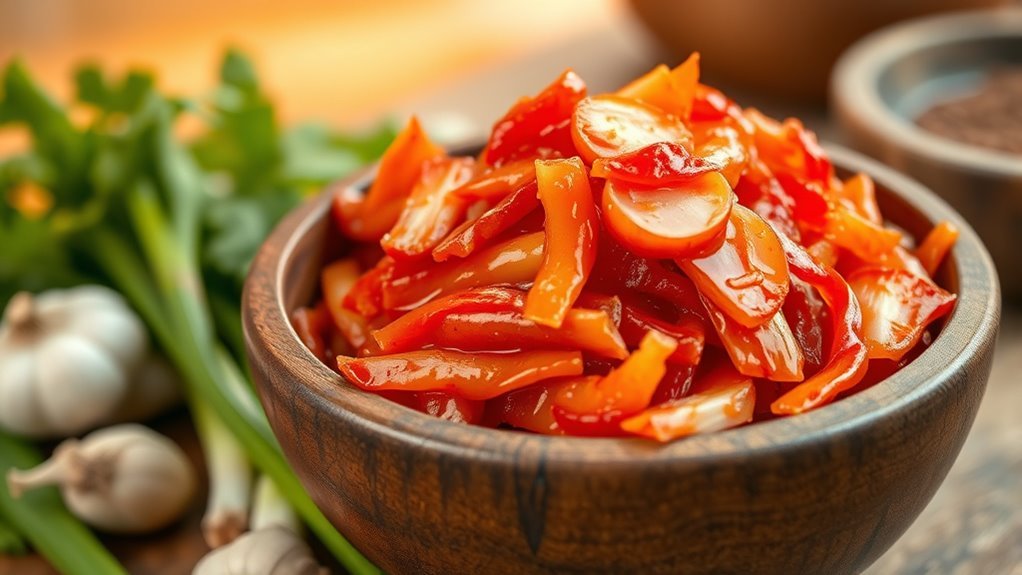Yes, kimchi is keto-friendly! With only 1-2 grams of net carbs per serving, it fits perfectly into your low-carb diet. This traditional Korean dish not only adds flavor but also offers health benefits like probiotics for gut health and vitamins A, B, and C. You can incorporate it into meals like scrambled eggs or salads without disrupting ketosis. If you’re curious about more ways to enjoy kimchi on your keto journey, there’s plenty more to discover!
Nutritional Profile of Kimchi

Kimchi, a traditional Korean fermented dish, boasts a unique nutritional profile that makes it a popular choice for many diets, including keto. The fermentation process not only enhances flavor but also increases beneficial probiotics, which can aid digestion and support gut health. You’ll find that kimchi typically incorporates various vegetable varieties, such as napa cabbage, radishes, and green onions, each contributing distinct nutrients. Rich in vitamins A, B, and C, it’s low in calories while offering essential antioxidants. This combination of nutrients and probiotics can promote overall well-being. Furthermore, the diverse flavors of kimchi allow you to enjoy it in various meals, making it a versatile addition to your diet. Embracing kimchi can truly enhance your culinary experience while maintaining nutritional balance.
Carbohydrate Content and Keto Compatibility

When considering the compatibility of kimchi with a keto lifestyle, it’s important to examine its carbohydrate content closely. Typically, a serving of kimchi contains about 1-2 grams of net carbs, making it relatively low in carbohydrates. This low carb count can fit nicely into your daily carb counting goals. Additionally, the fermentation effects can alter the way your body processes carbohydrates, potentially making them less impactful on blood sugar levels. While kimchi is often enjoyed in small portions, its flavor and probiotic benefits can enhance your meals without greatly affecting your ketosis. Ultimately, enjoying kimchi in moderation can be a delicious way to add variety to your diet while staying aligned with your keto principles.
Health Benefits of Kimchi

Fermented foods like kimchi offer a range of health benefits that can complement a keto diet. One of the standout features of kimchi is its probiotic properties, which support a healthy gut microbiome. These beneficial bacteria can enhance your digestive health, making it easier for your body to absorb nutrients and maintain regularity. Additionally, kimchi is low in calories but rich in vitamins and minerals, helping you stay nourished while adhering to your keto goals. Studies have shown that probiotics found in fermented foods may also boost your immune system and improve metabolic health. By incorporating kimchi into your meals, you’re not only adding flavor but also fostering overall well-being on your keto journey.
How to Incorporate Kimchi Into a Keto Diet
Incorporating kimchi into your keto diet can be both enjoyable and beneficial, as it adds a zesty kick to your meals while keeping carb counts low. You can start by adding kimchi to your scrambled eggs or avocado toast for breakfast. For lunch or dinner, mix it into stir-fries or salads to enhance flavors without the extra carbs. Consider using kimchi as a topping for grilled meats or keto-friendly tacos. There are countless kimchi recipes you can explore, from kimchi fried rice made with cauliflower to kimchi soup. Experimenting with these dishes not only diversifies your keto meals but also introduces beneficial probiotics, promoting gut health while maintaining your ketogenic lifestyle. Enjoy the freedom to create!
Choosing the Right Kimchi for Keto
Selecting the right kimchi for your keto diet is key to maximizing both flavor and health benefits. Look for kimchi that emphasizes low-carb ingredients, like napa cabbage, radishes, and garlic. The fermentation process adds probiotics, which can enhance gut health and support your overall well-being. However, be mindful of ingredient variations; some brands may include added sugars or high-carb vegetables that can disrupt your keto goals. Always check labels for nutritional content. Opting for traditional, homemade, or artisanal varieties often guarantees a more authentic flavor without unnecessary additives. By making informed choices, you’ll enjoy the delicious taste of kimchi while staying aligned with your keto lifestyle and embracing the freedom that comes with it.
Frequently Asked Questions
Can I Make My Own Keto-Friendly Kimchi at Home?
Absolutely, you can make your own keto-friendly kimchi at home! Start with low-carb vegetables like napa cabbage or radishes. Fermentation benefits include improved gut health and enhanced flavors. Simply mix those veggies with salt, garlic, ginger, and a keto-friendly sweetener if you like. Let it ferment for a few days, and you’ll have a delicious, tangy dish that fits your low-carb lifestyle while also promoting beneficial probiotics. Enjoy the freedom of customizing your kimchi!
Does Kimchi Have Any Preservatives or Additives?
When it comes to kimchi, many folks wonder about its ingredients and integrity. Generally, traditional kimchi relies on natural fermentation, which means it often doesn’t need preservatives or additives. The fermentation process enhances flavor and shelf life without artificial elements. However, some commercial varieties might sneak in preservatives to prolong their pantry presence. Always check the label to guarantee you’re savoring the simplicity of authentic, additive-free kimchi that celebrates fresh flavors!
How Long Does Homemade Kimchi Last in the Fridge?
Homemade kimchi can last in the fridge for several weeks to a few months, thanks to the fermentation process that preserves it. To maximize freshness, store it in an airtight container, ensuring it’s submerged in its brine. Keep an eye on the flavor; it’ll become tangier over time. If you notice any off smells or mold, it’s best to discard it. With these storage tips, you can enjoy your kimchi for longer!
Is Store-Bought Kimchi Usually Keto-Friendly?
When you’re checking out store-bought kimchi, it’s important to take into account its nutritional content. Many brands keep carb levels relatively low, making them a suitable option for those following a keto diet. However, some varieties can have added sugars, which increase carb counts. Always read labels carefully to confirm that it fits your dietary needs. With a little diligence, you can enjoy the tangy flavors of kimchi while staying true to your lifestyle choices.
Can Kimchi Help With Digestive Issues on a Keto Diet?
Ever wondered how a spicy, tangy dish could be your gut’s best friend? Kimchi’s probiotic benefits are fantastic for digestive health, especially if you’re on a keto diet. The fermentation process boosts gut bacteria, which can help alleviate bloating and improve overall digestion. Consuming kimchi regularly might just provide that extra support your digestive system craves, allowing you to enjoy your keto journey with fewer hiccups along the way.
Frequently Asked Questions about Kimchi and the Keto Diet
1. Is kimchi low in carbohydrates?
Yes, kimchi is generally low in carbohydrates, making it suitable for a keto diet. Most traditional recipes contain only a few grams of carbs per serving, primarily from vegetables like cabbage and radishes. However, it’s important to check the specific brand or recipe as additional ingredients can increase carb content.
2. Does kimchi have any health benefits for those on a keto diet?
Absolutely! Kimchi is rich in probiotics, which can aid digestion and promote gut health, particularly important for those on a keto diet who may experience digestive issues. It also contains vitamins A, B, and C, as well as antioxidants that can help reduce inflammation and boost overall health.
3. Can I make kimchi at home to fit my keto lifestyle?
Yes, you can easily make keto-friendly kimchi at home! Use low-carb vegetables like napa cabbage and daikon radish, and avoid adding sugar or high-carb ingredients. Instead, you can enhance flavor with spices, garlic, ginger, and fish sauce, all of which are low in carbs.
4. How much kimchi can I eat on a keto diet?
The amount of kimchi you can consume depends on your overall daily carbohydrate limit on the keto diet. Generally, 1-2 servings a day (about 1/4 to 1/2 cup) is reasonable for most people. Just be mindful of the total carb intake from all sources to stay within your keto goals.
5. Are there any potential downsides to eating kimchi on a keto diet?
While kimchi is generally healthy, some individuals may experience digestive discomfort due to its high fiber and probiotic content. Additionally, store-bought kimchi may contain added sugars or preservatives, so always read labels carefully. If you’re sensitive to spicy foods, the heat from kimchi might also cause issues, so start with small amounts and adjust based on your tolerance.
References
- https://en.wikipedia.org/wiki/Kimchi
- https://www.ncbi.nlm.nih.gov/pmc/articles/PMC6361521/
- https://www.healthline.com/nutrition/what-is-kimchi
- https://www.webmd.com/diet/what-is-keto-diet
- https://www.health.harvard.edu/staying-healthy/the-ketogenic-diet
- https://www.cdc.gov/healthyweight/healthy_eating/index.html
- https://www.verywellfit.com/what-is-the-keto-diet-4112064
- https://www.journalofethics.ama-assn.org/article/what-keto-diet/2021-07


